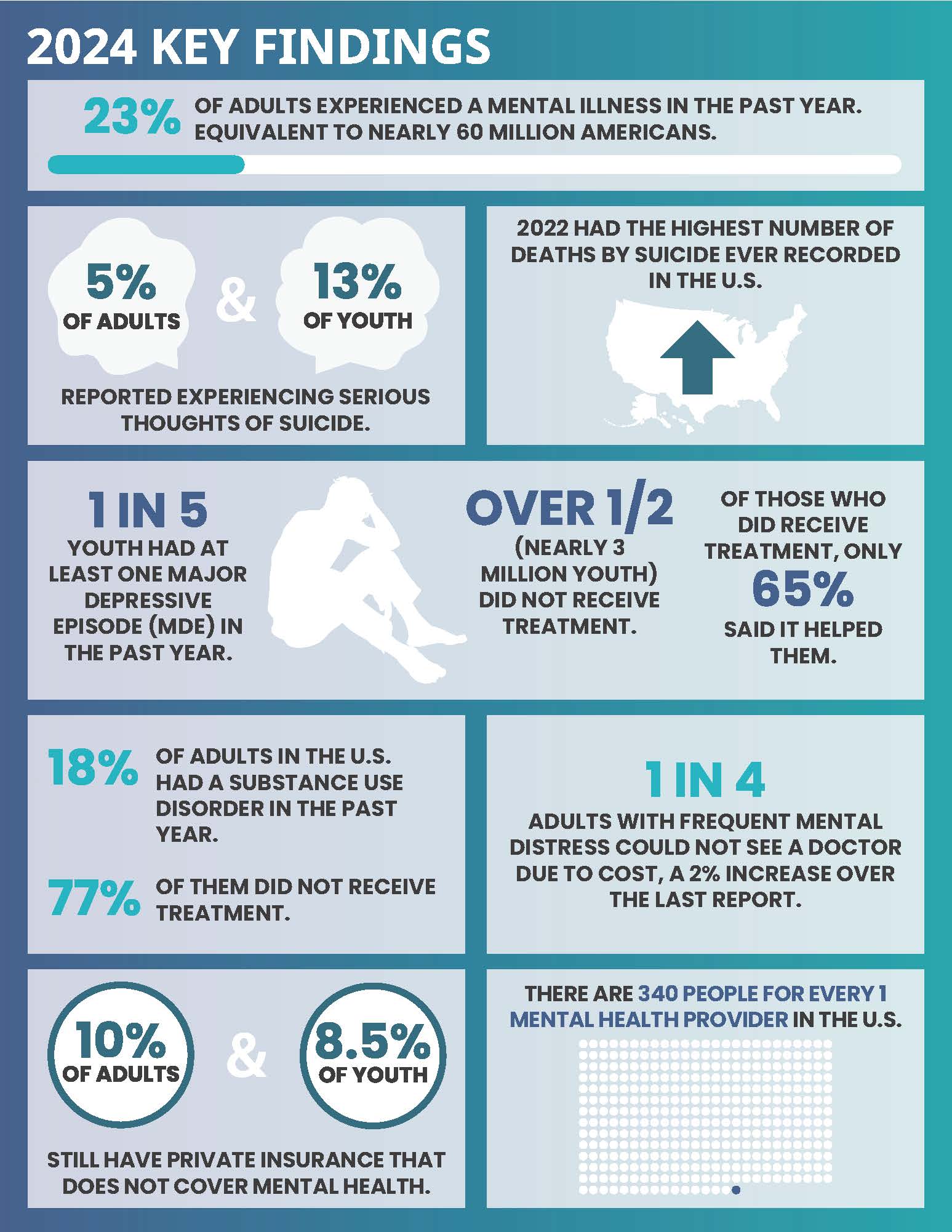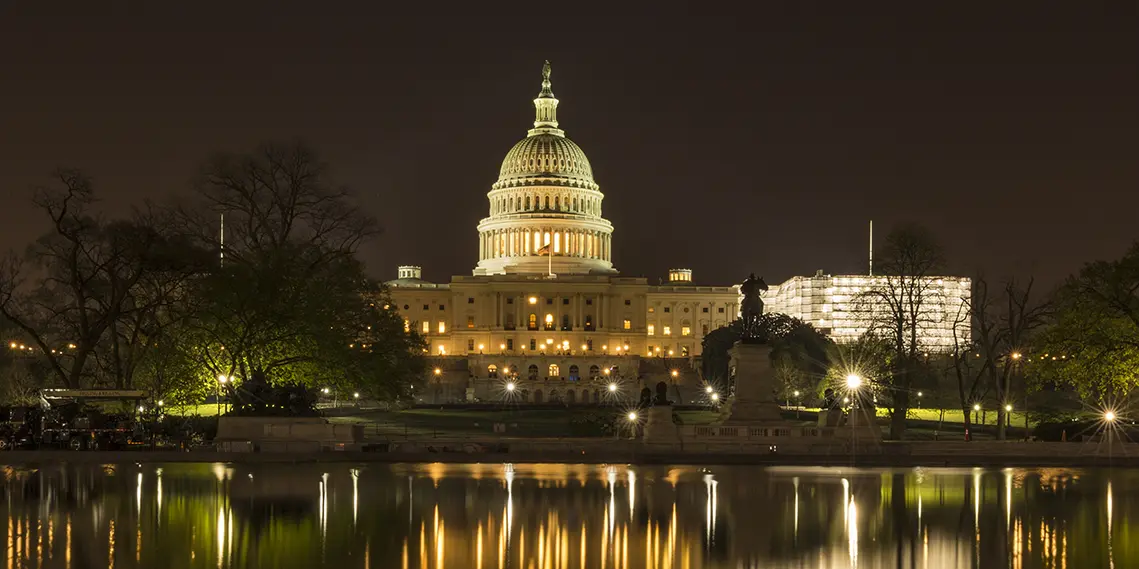The State of Mental Health in America
Mental Health America (MHA) is dedicated to the promotion of mental health, well-being, and illness prevention. We envision a world in which all people and communities have equitable opportunity for mental well-being and are enabled to flourish and live with purpose and meaning.
We believe that gathering and providing up-to-date data and information about disparities faced by individuals with mental health problems is a tool for change.
The COVID-19 pandemic had a serious impact on the ability to collect national surveillance data in 2020. As a result, SAMHSA has determined that 2021 will represent a trend break from previous years, meaning the results of the NSDUH moving forward will not be comparable to data collected before 2021. Eleven of the 15 indicators used to rank the states in the 2024 State of Mental Health in America report were calculated using the 2021-2022 NSDUH data. This is a reminder that the 2024 State of Mental Health in America report cannot be compared to previous reports. For more information, see SAMHSA’s statement here.
FILL OUT THE FORM BELOW TO DOWNLOAD THE PRINTABLE VERSION OF THE REPORT.
Key Findings 2024:
- In 2021-2022, 23% of adults experienced a mental illness in the past year, equivalent to nearly 60 million Americans.
- More than 5% of the U.S. adult population (12.8 million people) reported experiencing serious thoughts of suicide. After slight decreases in suicide deaths in 2019 and 2020, the number of individuals who died by suicide in 2022 was the highest number ever recorded in the U.S.
- 13% of youth ages 12-17 reported experiencing serious thoughts of suicide. The percentage of youth reporting suicidal ideation was highest among youth who identified as Native Hawaiian or Other Pacific Islander (25%) and more than one race (20%).
- 1 in 5 youth had at least one major depressive episode (MDE) in the past year. Over half of them – nearly 3 million youth - did not receive treatment. Of those who did receive treatment, only 65% said it helped them.
- The vast majority of individuals with a substance use disorder in the U.S. are not receiving treatment. 18% of adults in the U.S. had a substance use disorder in the past year. Of them, 77% did not receive treatment.
- 9% of youth in the U.S. had a substance use disorder in the past year. Youth were more likely to struggle with drugs than alcohol - 3% had an alcohol use disorder in the past year, while 7% had a drug use disorder.
- 60.5% of youth in the U.S. are flourishing, which is associated with school engagement and other positive outcomes for youth. The percentage of youth who were flourishing was highest in Georgia, Illinois, and Hawaii.
- Cost is still a significant barrier to accessing mental health care. 1 in 4 adults with frequent mental distress could not see a doctor due to cost, a 2% increase over the last report.
- 10% of adults with a mental illness are uninsured. In 2022, 64% of adults who were uninsured said that they did not have health insurance because they could not afford it.
- Millions of adults and youth in the U.S. still lack parity in insurance coverage of mental health and substance use services. 10% of adults and 8.5% of youth still have private insurance that does not cover mental health.
- Only 0.67% of students are identified as having an emotional disturbance (ED) for an Individualized Education Program (IEP). While there was an increase in mental distress among students from 2019-2021, the percentage of students identified with emotional disturbance for an IEP decreased in all states except for Wyoming, Texas, and South Dakota.
- There are 340 people for every 1 mental health provider in the U.S. However, these figures may be an overestimate of active mental health professionals, as it may include providers who are no longer practicing or accepting new patients.
Explore the web-based report using the links provided on the left or download the printable report above.

In the above links you will find a collection of data across all 50 states and the District of Columbia answering the following questions:
- How many adults and youth have mental health issues?
- How many adults and youth have substance use issues?
- How many adults and youth have access to insurance?
- How many adults and youth have access to adequate insurance?
- How many adults and youth have access to mental health care?
- Which states have higher barriers to accessing mental health care?
Our goal:
- To provide a snapshot of mental health status among youth and adults for policy and program planning, analysis, and evaluation;
- To track changes in the prevalence of mental health issues and access to mental health care;
- To understand how changes in national data reflect the impact of legislation and policies; and
- To increase dialogue with and improve outcomes for individuals and families with mental health needs.
Why gather this information?
- Using national survey data allows us to measure a community’s mental health needs, access to care, and outcomes regardless of the differences between the states and their varied mental health policies.
- Rankings explore which states are more effective at addressing issues related to mental health and substance use.
- Analysis may reveal similarities and differences among states, allowing for assessment of how federal and state mental health policies result in more or less access to care.
The content of this webpage is the property of Mental Health America. MHA grants a limited license to use the webpage, or portions thereof, only if, whenever the webpage is used in written or electronic form, it is clearly stated that the website was created by and is the property of Mental Health America and a link is provided to www.mhanational.org. Under no circumstances may the website be used for any commercial purpose without the express written permission of Mental Health America. For permission to use the content of this webpage, please contact info@mhanational.org.


